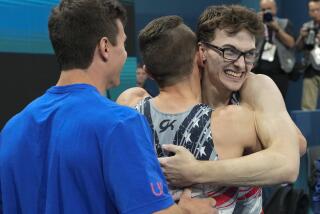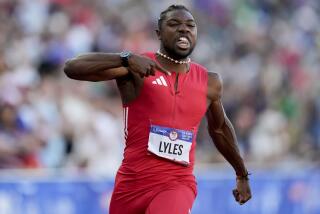French Skier Is Surprise du Jour
- Share via
SESTRIERE, Italy — The Olympic downhill was supposed to be about Austrians and Americans, but it turned out to be deja vu for the French.
Eight years ago, the unsuspecting Jean-Luc Cretier struck gold in Nagano.
Sunday, under clear skies, on a mountain peak that is actually closer to France than to Turin, the French pulled another fast one.
Now etched into Alpine lore is, voila, 29-year-old Antoine Deneriaz, who stole the snow when he bee-lined from the 30th start position, pick-pocketing the gold medal from Michael Walchhofer of Austria.
Deneriaz’s winning run wasn’t a fluke, it was brilliant. Stuck with a late start position, on a used-up course, he somehow found a line no one could match as he scorched the course with a winning time of 1 minute 48.80 seconds.
“It’s the best day of my life,” Deneriaz said.
Walchhofer, who was preparing his victory speech, settled for the silver -- and settling is what Austria does when the medal isn’t gold in an event it has won a record six times.
Walchhofer finished .72 of a second behind Deneriaz, whose winning margin was the largest in the Olympic downhill since the 1964 Innsbruck Games, and Bruno Kernen of Switzerland earned the bronze with a time of 1:49.82. American Daron Rahlves, considered one of the favorites by many, was 10th.
Deneriaz’s charge also spoiled a special day for Kjetil Andre Aamodt of Norway, who was primed to win his eighth Olympic medal until the Frenchman knocked him from third to fourth.
Hermann Maier, the Austrian “Herminator,” who was looking to add Olympic downhill to his list of famous feats, finished sixth.
“No power, no power,” said Maier, battling a cold and vowing now to “head to the sea” before Saturday’s super-giant slalom.
America? It was not so beautiful. You might describe the day as red, white and blew it.
Defending World Cup overall champion Bode Miller finished a respectable fifth, only .11 out of a bronze medal, but Rahlves waddled in five spots lower. Scott Macartney, who made the team in a race-off Saturday, was thrilled with his 15th-place finish. Steve Nyman was 19th.
This, however, wasn’t what the United States Ski and Snowboard Assn. had in mind with its “Best in the World” campaign. Coaches had targeted eight medals for the men’s and women’s Alpine skiers and were counting on one, perhaps two, in the men’s downhill.
“It’s disappointing,” men’s Coach Phil McNichol said. “We had two of the best guys in the race and we came up short.”
Miller actually posted his third-best finish in downhill this year and was a couple tiny mistakes removed from a medal.
“It was the run I’d like to put down at the Olympics,” Miller said afterward.
If Miller was nervous, it didn’t show, as he had to be rousted from bed Sunday morning at 9:45. He has four events left and will be one of the favorites in Tuesday’s combined event.
Sunday was a much more bitter pill for the 32-year-old Rahlves, who seemed primed for a gold-medal performance. He has won three downhill events this season and had posted the fastest training run Thursday.
“I came in 10th,” a disappointed Rahlves said. “I wish I could knock a zero off.”
Miller and Rahlves are staying in separate recreational vehicles in Sestriere, parked next to each other.
While Miller was sleeping in Sunday, Rahlves was up early.
“I was really nervous this morning, but when I got to the gate I was ready to go,” he said.
You knew it was over for Rahlves, skiing 20th, when he skied only the 29th-fastest first interval, a span of 16 seconds that cost him the race. Rahlves, who weights only about 185 pounds, needed to nail the technical portions near the top and carry that speed into the flats.
It just never happened.
Rahlves has another medal chance in the super-G, but he had all but staked his career on Sunday’s race. Everything seemed to be in place.
He thought the same four years ago at the Salt Lake City Games, when he finished 16th, and then eighth in super-G.
“I’m kind of surprised,” Rahlves said of his performance. “I don’t know where the speed was today.”
It was in France.
Deneriaz was a surprise, for sure, but certainly no Jacque-come-lately. He was a three-time winner on the World Cup downhill tour and had finished 12th in the event at the 2002 Olympics, but a knee injury suffered 13 months ago altered his career path.
Deneriaz, from Mont Blanc, about 80 miles from Sestriere, tore ligaments in his left knee in a World Cup training run in January 2005 at Chamonix, France.
As he was taken by stretcher to the helicopter that would fly him to knee surgery, Deneriaz faced an uncertain future.
Yet, he was already looking ahead. The world championships in March at Bormio, Italy, were out of the question, but what about Turin?
“In the stretcher, I told my coach, ‘I’m not going to be world champion, but I’ll be Olympic champion,’ ” Deneriaz said.
He gave no inkling of becoming champion Saturday when he posted the fastest time in the final training run. No serious challenger leaves his best race on the course 24 hours early -- or so it was thought.
Deneriaz said he was kidding when he said “pop the champagne” after he crossed the finish line then, as if this meaningless run was going to be a prelude to Olympic glory.
Most of the contenders used Saturday to manipulate their runs to finish between 20th and 30th, as Sunday’s start list was in inverse order of the final training-run finish.
Most medal contenders preferred starts in the top 10, and this entails some maneuvering.
Deneriaz made mincemeat of that theory as his first-place training finish earned him the 30th starting position -- good enough for gold.
He said he was trying hard not to win that training run but, the hill couldn’t hold him.
“It was his course,” Walchhofer, the runner-up, said.
It was his day.
More to Read
Go beyond the scoreboard
Get the latest on L.A.'s teams in the daily Sports Report newsletter.
You may occasionally receive promotional content from the Los Angeles Times.







